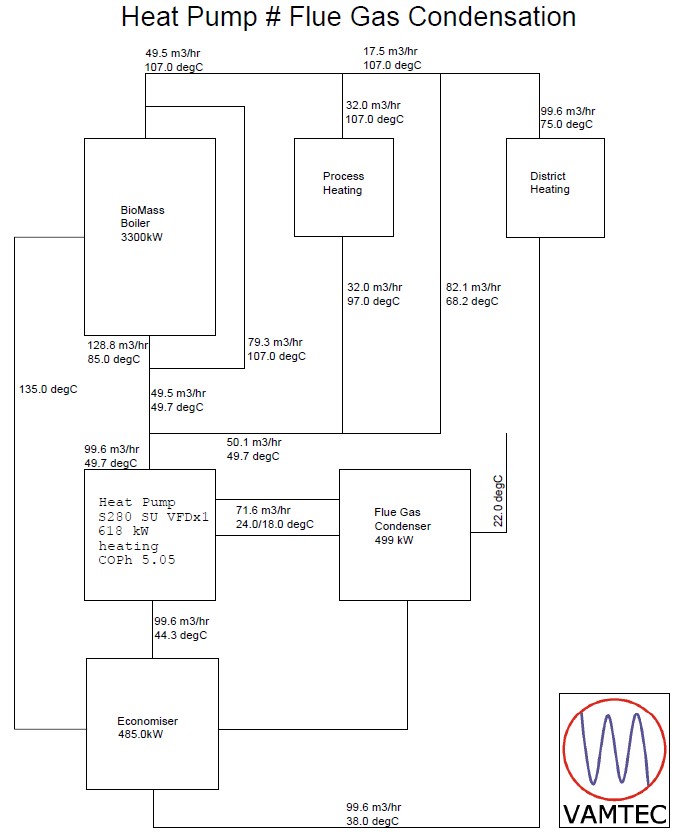Enhancing Energy Efficiency with Vamtec Solutions
Flue gas condensation is a cutting-edge technology that significantly improves boiler efficiency by recovering waste heat energy. This process not only enhances energy efficiency but also contributes to environmental sustainability. Vamtec, a leader in innovative heating and cooling solutions, offers advanced systems that leverage flue gas condensation to maximize energy recovery and reduce operational costs.

What is Flue Gas Condensation?
Flue gas condensation involves cooling flue gases below their dew point, causing water vapour to condense and release latent heat. This recovered heat can be utilised for various applications, such as district heating or preheating boiler feed-water. The process is particularly effective for fuels with high moisture content, such as biomass and municipal waste.
How Flue Gas Condensation Works
- Cooling the Flue Gas: Flue gases are cooled using a heat exchanger or a condensing scrubber. As the temperature drops below the dew point, water vapor condenses, releasing significant amounts of heat.
- Heat Recovery: The latent heat released during condensation is captured and transferred to a secondary fluid, which can be used for heating purposes.
- Condensate Management: Excess condensed water is continuously removed to prevent corrosion and maintain system efficiency.
Benefits of Flue Gas Condensation
- Increased Efficiency: By recovering waste heat, flue gas condensation can improve boiler efficiency by up to 15%, as demonstrated by Vamtec’s solutions.
- Environmental Impact: Reducing waste heat emissions lowers greenhouse gas emissions, contributing to a cleaner environment.
- Cost Savings: Enhanced efficiency translates to lower fuel consumption and reduced operational costs.
More on sustainability benefits:
Flue gas condensation technology offers several significant environmental benefits:
- Reduction in Greenhouse Gas Emissions: By recovering waste heat, flue gas condensation reduces the need for additional fuel combustion, thereby lowering carbon dioxide (CO₂) emissions. This contributes to mitigating climate change.
- Lower Emissions of Harmful Pollutants: The process captures water vapor and other pollutants in the flue gas, such as sulphur dioxide (SO₂) and nitrogen oxides (NOₓ), reducing their release into the atmosphere. This helps improve air quality and reduces acid rain.
- Energy Efficiency: Enhanced energy recovery means less fuel is required to achieve the same heating output, leading to a decrease in overall fuel consumption. This not only conserves natural resources but also reduces the environmental impact associated with fuel extraction and processing.
- Water Conservation: Flue gas condensation can also contribute to water conservation by reducing the need for external water sources in industrial processes. The condensed water can be treated and reused within the system.
- Waste Reduction: By capturing and utilizing waste heat, the technology minimizes the amount of waste energy released into the environment, promoting more sustainable industrial practices.
Overall, flue gas condensation technology supports a more sustainable and environmentally friendly approach to energy production and industrial operations.
Vamtec’s Innovative Solutions
Vamtec offers a range of products designed to optimize energy recovery through flue gas condensation:
- Industrial Heat Pump: This system recovers up to 0.5 MW of heat from 3.3 MW biomass boilers, cooling flue gases down to 22°C. It operates efficiently across a wide range of loads, with a Coefficient of Performance (COPh) of 5.05
- Absorption Heat Pump: Utilizing waste heat from flue gases, Vamtec’s absorption heat pump provides efficient heating solutions for various industrial applications
Conclusion
Flue gas condensation is a powerful technology that enhances boiler efficiency and promotes sustainability. Vamtec’s innovative solutions harness this technology to deliver significant energy savings and environmental benefits.
